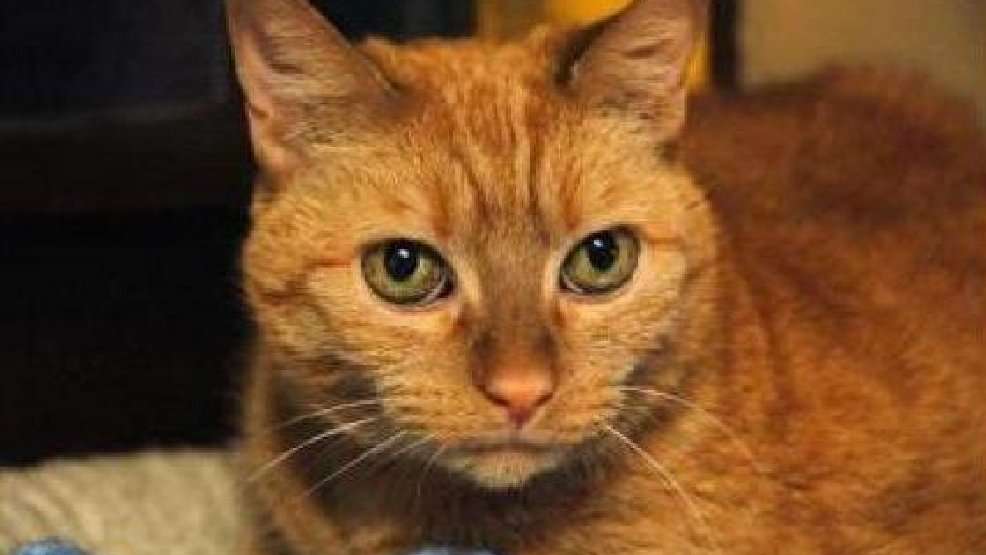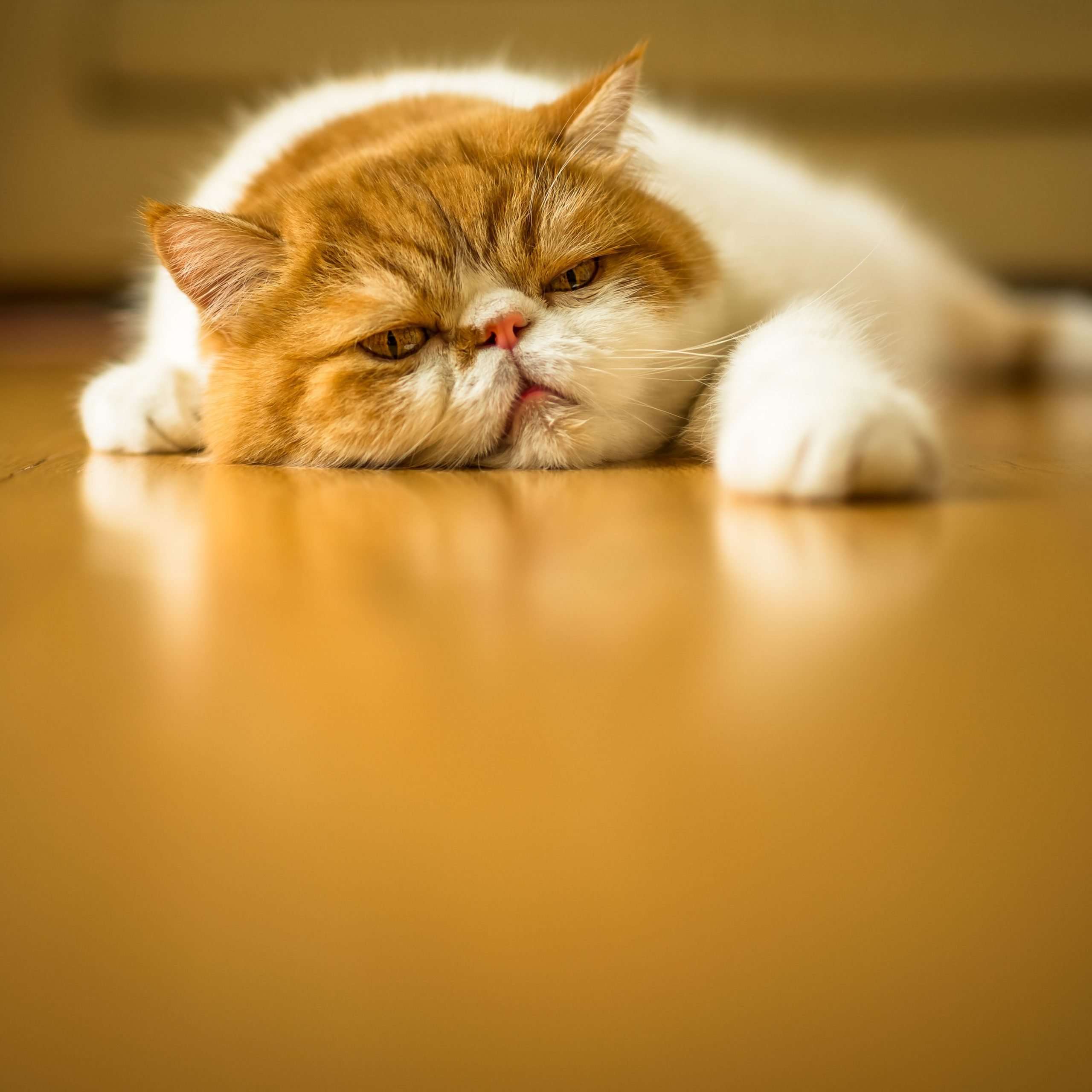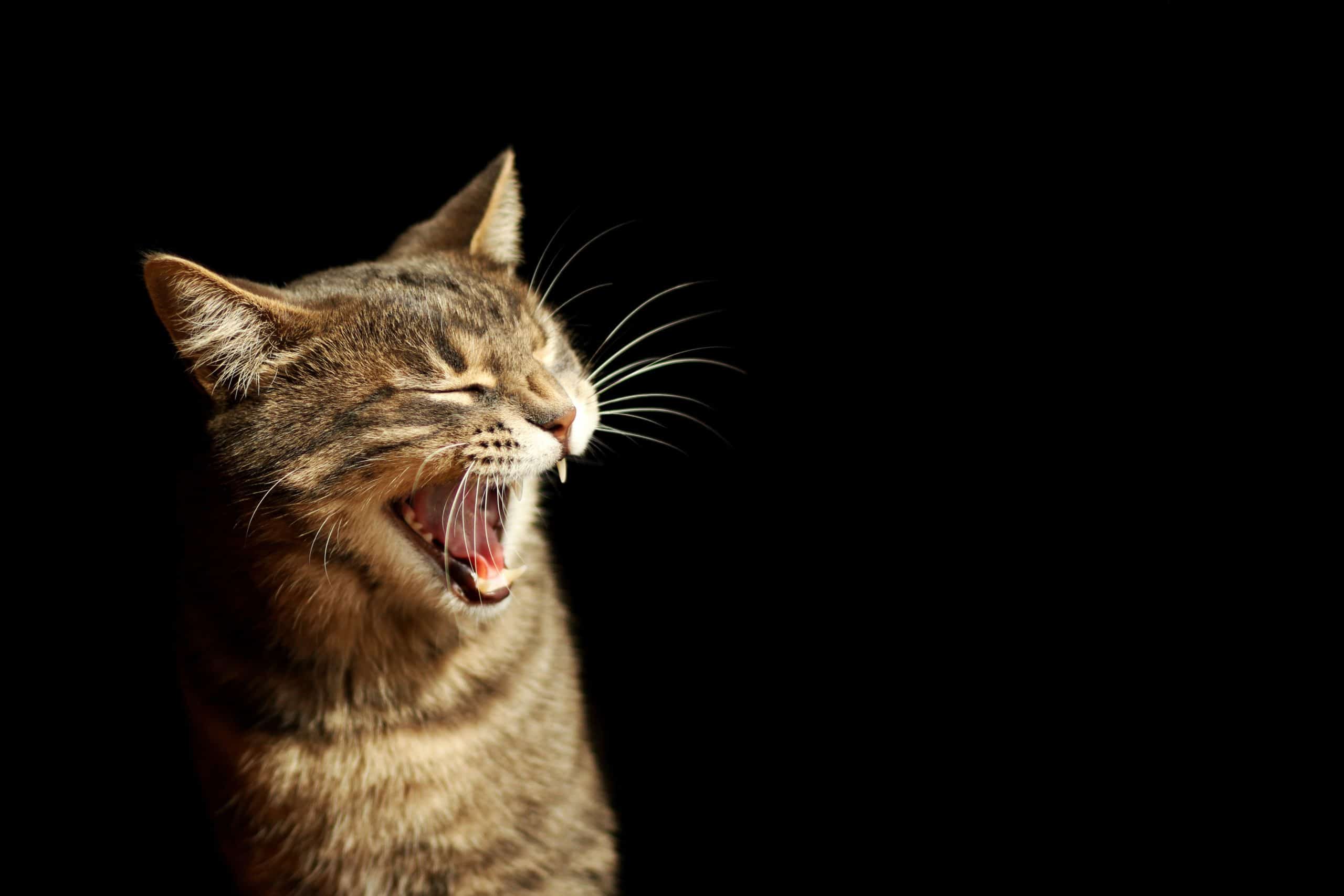Symptoms Of Vomiting With Bile In Cats
Vomiting with bile typically occurs in the morning or early evening, when a cats stomach is empty, although it can also happen at any time. Here are the main symptoms to watch for:
- Long term occasional vomiting
- Vomiting that occurs with bile which may be yellow or green and/or foamy. There is normally not a large amount of liquid
- Weight Loss
- Excessive Drooling
Types
Vomiting can take many forms, and its important to distinguish the various types to know when a serious condition exists that warrants a trip to your local vet.
- True Vomiting.
Vomiting is accompanied with nausea and a cat may drool and refuse food. Some will lick their lips and may be depressed for a few hours. The abdomen forcefully contracts before and during a vomit. Your cat may gag and retch.
- Regurgitation:
Regurgitation is when undigested food is brought back up from the stomach. There are no abdominal contractions and a cat is not nauseous. There are several potential causes including eating too quickly. Bile should not be seen.
- Hairball:
Hairballs are regurgitated or cleared from your cats stomach in a manner that may seem similar to vomiting. They cat may heave for several moments attempting to clear the hairball and may also bring up a small amount of stomach fluid or regurgitated food with the hairball due to the aggressive coughing.
Eating Too Much Too Quickly
If your cat eats too much, too quickly vomiting will likely result soon after they eat. A number of fun cat bowls are available to help slow your cat’s eating, if your cat eats too quickly. That said, throwing up right after eating can be an indication of a more serious problem such as hairballs, dehydration, esophageal issues,; or a digestive tract obstruction. If your cat frequently vomits right after eating, a trip to the vet is required.
What Can I Do If My Cat Is Being Sick
If your cat has been sick;once or twice but otherwise appears well:
- Remove food for two hours, but continue to provide water
- After this time, try offering a teaspoon of their usual food or bland low-fat cooked food such as chicken or white fish
- If they keep this down, offer small amounts every few hours for thenext 24 hours
- Then go back to your usual routine
If this does not resolve the sickness and you are concerned about your cat vomiting;repeatedly, call your vet or, out of hours, your nearest Vet Now emergency clinic or 24/7 hospital immediately.
You should also contact your vet if:
- Your cat cannot keep water down
- Has blood or unusual material in her vomit
- Has pale or cold gums
- Is displaying signs of listlessness, diarrhoea, fever, or;another illness
Read Also: Can Rabbits And Cats Get Along
When Should I Be Worried About My Cat Vomiting
If your cat becomes unwell or vomits multiple times in quick succession, you should give your vet a call for advice.; Severe, acute vomiting can be caused by serious underlying issues and can quickly result in dehydration and electrolyte imbalances that need to be corrected.;;
Chronic vomiting can also be a concern. This is where your cat has vomited regularly and consistently for a number of days with no signs of improvement. They may also have a reduced appetite as a result of the condition.;
If your cat has not eaten for more than 36 hours, you should take them to see a vet. Cats can suffer from serious food aversion issues if they do not eat for a significant period of time.
What If My Cat Is Vomiting Blood

Bright red blood in the vomit indicates active bleeding somewhere between the mouth and the upper part of the small intestine. This is commonly caused by a foreign body that is stuck and irritating or eroding the walls of the gastrointestinal tract. The presence of blood in vomit is serious; go to the veterinarian right away.
You May Like: How Old Is 3 In Cat Years
Home Remedies For Cat Vomiting
Its best not to try to treat your cats vomiting at home without consulting your veterinarian first. Many causes of cat vomiting, such as a foreign body or obstruction, can cause severe damage or even death if not appropriately treated right away.;
If your cats vomiting is simply due to hairballs, your veterinarian may recommend giving an over-the-counter hairball treatment daily to help the hair pass through your cats digestive tract.;
Never give your cat any medicationseither prescription or over-the-counter products unless directed to do so by your veterinarian.;
Eating Stuff Cats Shouldnt
Kitties are playful and curious, which can sometimes cause them to ingest items that arent meant for cats to swallow. This can include grass and plants, household items like paper clips and rubber bands, pieces of string or other toys, and just about anything else that is within reach and small enough.
In most cases, vomiting solves the problem, but in terms of potentially poisonous plants or sharp objects, its smart to follow up with your veterinarian.
Don’t Miss: Do Cats Hide When They Are Dying
Treatment For Diabetic Cats
The goal of treatment is to have a cat that is free of diabetic symptoms with a blood glucose level that is near the normal range.
To achieve this, the course of treatment will have to be individualized to your cat. Diet change and weight loss may be prescribed in addition to insulin therapy.
If your cat has developed the complication of diabetic ketoacidosis, they will be hospitalized and given IV insulin as well as IV fluids until they are eating and their blood sugar and electrolytes stabilize. Then they will be switched to subcutaneous insulin and sent home.
Infections can interfere with proper glucose regulation, so if your cat has any infections, those will need to be treated first. Urinary tract infections are common in diabetic cats, and your veterinarian may recommend regular screening to prevent complications.
Ways To Prevent Cat Vomiting
Wouldn’t all pet parents love to know the secret to eliminating pet vomit? Or even a way to train your cat not to do it on your bed or carpet? Unfortunately, there’s no magic word. But there are a few things you can try to ease your cleanup and your kitty’s discomfort.
The easiest vomit comet to stop is hacking up hairballs. By brushing your cat regularly, keeping her active and feeding her food with balanced nutrition, you may be able to reduce the number of hairballs.
When it comes to regurgitating, make sure you feed your cat at the same time every day. Give her the amount of food recommended by your vet and have clean, fresh water available at all times. A cat that is experiencing frequent upset could become dehydrated. While most cats will get the majority of their water from their food, throwing up could result in loss of water, so make sure to give her plenty of access to water and encourage her to drink when possible. These three simple actions can go a long way in preventing overeating or eating too quickly. For a cat who still bolts her food, you can try a puzzle feeder or a dry food with large, crunchy pieces to slow her down.
Special foods or medication prescribed by your vet may also help relieve underlying health issues or allergies that lead to your cat vomiting. Be sure your cat sees the vet regularly and discuss your concerns.
You May Like: How To Play With My Cat
Petcube Care Members Can Try Out Vetted
All 10/30 day Petcube Care members can talk to a vet technician via live chat and phone, powered by Vetted. It’s an easy, convenient way to ask general questions and get some advice on your pet’s well-being and health. The best part? It’s free for up to 5 times a month. Click here and give it a try.
You might also like
Prevent Gagging In Cats
While there are some unforeseen reasons a cat keeps gagging, there are some general preventive methods we can employ. They include:
- Provide suitable diet: if the cat’d diet is inappropriate for their eating habits or physical issues, then we will need to adapt it to them. This is also required if the cat has kidney and/or liver disease since an amended diet can help promote proper organ function.
- Remove choking hazards: do not leave objects or materials on which the cat is likely to choke, especially if it is something which seems appetizing to them.
- Remove toxic products: similar to choking hazards, do not allow the cat access to agents which can poison them. This includes plants which are toxic to cats, even if they are harmless to us.
- Checkups: take the cat for annual or biannual veterinary checkups to troubleshoot any problems. This is particularly important for senior cats who are more prone to disease.
This article is purely informative. AnimalWised does not have the authority to prescribe any veterinary treatment or create a diagnosis. We invite you to take your pet to the veterinarian if they are suffering from any condition or pain.
If you want to read similar articles to My Cat Keeps Gagging – Causes & Treatment, we recommend you visit our Other health problems category.
Also Check: Can You Catch A Cold From A Cat
Causes Of Vomiting In Cats
The causes of acute or chronic vomiting can be the same, but there are exceptions. Toxins are generally not a cause of chronic vomiting . Ingesting a foreign body is not normally a cause of chronic vomiting, although if the foreign object remains in the stomach, it can be a cause of chronic vomiting.
Unfortunately, vomiting is a very vague symptom, and the causes are extremely varied. In fact, almost any feline illness can result in vomiting. In general, the causes of vomiting can be placed in one of these categories: toxins, drugs, diet , gastric , intestinal, organ dysfunction, endocrine, neurologic , infectious and cancer. In each of these categories are dozens of specific diseases and syndromes. Some of the more common causes are listed below:
- Toxins: Lilies, antifreeze
- Diet: Dietary intolerance to something in food, sudden change in diet, eating a dead thing
- Gastric: Foreign bodies, ulcers, inflammation of the stomach
- Intestinal: Foreign bodies, acute inflammation, inflammatory bowel disease , cancer, constipation
- Organ dysfunction: Liver disease, kidney disease, pancreatitis
- Endocrine: Hyperthyroidism , elevated calcium, diabetes ketoacidosis
- Neurologic: Vestibular disease , encephalitis , cancers
- Infectious: Feline infectious peritonitis, feline panleukopenia, heartworm
- Cancer: Can be a direct cause, such as intestinal cancer, or an indirect cause, such as mast cell tumors in the skin
What Is Gagging In Cats

Gagging is an action which is a result of a reflex motion, meaning it is not usually a voluntary action. When muscles contract at the back of the cat’s throat, they gag as a reaction. Known as the pharyngeal reflex or gag reflex, it helps prevent choking in cats since the reflex can expel objects which might otherwise be stuck in their esophagus. We can see this when a cat eats too fast as the reflex acts when too much food is trying to pass the back of the throat.
Although retching might prevent objects going down the back of the throat , it can also cause them to be expelled outward. This often occurs when the respiratory system is in jeopardy. If food or other objects are likely to go into the respiratory system, the gag reflex may be triggered and the objects expelled.
While the gag reflex usually enacts because of stimulation of the nerves in the pharynx area, it may also happen when nothing appears to be there. This can be the case if the cat is sick as bacterial proliferation might trigger the gag reflex. For more information on why a cat keeps gagging, which show you the common cause below.
Also Check: Why Does My Cat Look At Me And Meow
How Do I Know If I Should Take My Cat To The Vet
If your cat is vomiting periodically or infrequently, avoid giving your cat any food for about 12 hours. Provide kitty with a couple of tablespoons of water every 30 minutes or provide them with ice cubes during this brief fasting period. After 12 hours begin providing your cat with small amounts of bland food and gradually return to normal feeding if vomiting has stopped.
If your cat is experiencing repeated bouts of vomiting, you should contact your vet immediately. Continuous or severe vomiting could be a sign that your cat is seriously ill and requires immediate treatment. Contact your vet if your cat displays any of the symptoms below:;
- Repeated vomiting
How To Reintroduce Food To Your Cat
Read Also: What Does It Mean When A Cat Hisses At You
Yes Its A Gross Topic But Its An Important One To Talk About Lets Go Over Vomiting In Cats And When You Should Be Worried
Cats are creatures known for vomiting every now and then. If youve ever owned a cat, you know that they occasionally throw up hairballs or food. But when does vomiting become a reason to worry, and when should a cat be taken to the vet for a checkup because of vomiting?
We cover some basic information below to help you keep your pet happy and healthy, but remember that if your kittys vomiting just doesnt seem normal, your vet is the best person to call.
Related: When A Cat Hairball Is Normal And When Its Not
When To Worry About Your Cat’s Vomiting
If your cat is vomiting periodically or infrequently, avoid giving your cat any food for approximately 12 hours. Provide your cat with a couple of tablespoons of water every 30 minutes or provide them with ice cubes during this brief fasting time. After 12 hours begin providing your cat with small amounts of bland food and gradually return to normal feeding if vomiting has stopped.
If your cat is having repeated bouts of vomiting contact your vet immediately. Continuous or severe vomiting could be a sign that your cat is seriously ill and requires immediate treatment. Contact your vet if your cat displays any of the symptoms below:;
- Repeated vomiting
Read Also: How Do You Bathe A Cat
When Is Vomiting Considered An Emergency
Stop all food and water and call the veterinarian when:
- Vomiting persists for more than 24 hours and the cat is neither eating or drinking.
- Vomiting occurs when the cat attempts to eat or drink.
- Vomiting is accompanied by diarrhea.
- Cat is vomiting fresh blood or brown material .
- Cat is weak, lethargic or shows signs of illness.
Diagnosing Diabetes In Cats
After a physical exam and discussion of your cats symptoms, your veterinarian will take blood and urine samples for testing.
In addition to checking the glucose levels in your cats blood and urine, your vet will be checking for evidence of other diseases that have symptoms similar to diabetes, like kidney disease and hyperthyroidism.
They will also check for conditions that can complicate the treatment of diabetes, like infections and diabetic ketoacidosis, which require hospitalization.
Don’t Miss: How Much Dry Food To Feed A Kitten
Cat Vomiting: Types Causes And Treatments
If you have cats, youve probably seen one of them throw up at one time or another. It is common for cats to vomit, but its never normal for them to do so. With that said, it is also not always something that has to be treated, nor does the cat need to be rushed to a veterinarian every time she vomits. In this resource, youll get the scoop on when to take a vomiting cat to the vet, why cats vomit and what treatments are available to help felines feel better.
Primary Cause Of Diabetes In Cats

The primary cause of diabetes in cats is that the insulin that their body produces is either insufficient or ineffective. This means that insulin is either not helping glucose get into the cells to supply energy or that there is not enough insulin to do its job efficiently.
There are a few different ways that cats can contract diabetes.
You May Like: How To Get A Sick Cat To Eat
Why Does My Cat Vomit After Eating Dry Food
We must first distinguish whether your cat is vomiting up food or hair. Due to a cats daily grooming routine, it is normal that it will ingest a lot of hair which will sometimes be expelled through vomiting. A diet rich in fiber, regular brushing and the occasional consumption of malt can prevent hairballs in cats from posing a problem. If your cat is excessively vomiting up hairballs, this could be caused by excessive grooming which is a symptom of stress in cats. For more, we recommend taking a look over our article: my cat is overgrooming- causes.
Is your cat vomiting undigested food? If this is the case, you should analyze whether this occurs immediately after eating or some time after eating:
A cat vomiting immediately after eating or within half an hour after eating may indicate both acute and chronic gastritis. A cat vomiting up its food hours after eating could be due to obstruction, slow functioning of the digestive system and/or pancreatitis.
For more, we recommend reading: intestinal blockage in cats.